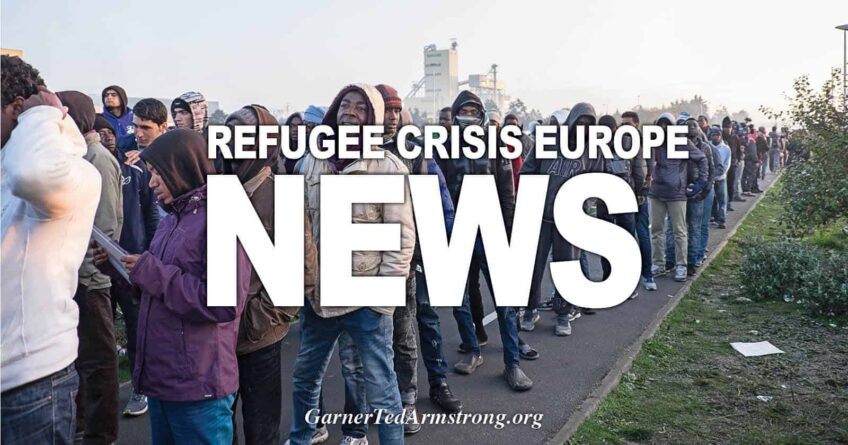
Tareq Alaows stands in front of the Bundestag, Germany’s parliament, in Berlin. Alaows came to Germany as an asylum-seeker from Syria in 2015. He launched a campaign to run in Germany’s federal election in September for the Green Party but recently withdrew his candidacy. —Markus Schreiber/AP
BERLIN — Tareq Alaows was hoping to become the first Syrian refugee to win a seat in Germany’s parliament when the country goes to the polls in September.
Speaking to NPR in February after announcing his candidacy with the Green Party, the 31-year-old lawyer and human rights activist from Damascus was full of ambition to help make Germany a better place.
“From my own experience as an asylum-seeker, I know that Germany needs to improve its integration policies, because they impact everyone, not just refugees,” he said. “I want to effect change for everyone in Germany.”
When Alaows fled the war in Syria in 2015, he thought he was leaving the threat of violence behind him. “The whole reason I came to Europe was so that I could live in safety and with dignity,” he said.
That has not come to pass. Citing death threats and a racist offensive against him and people close to him, Alaows withdrew his candidacy to represent the constituency of Oberhausen, in North Rhine-Westphalia state, in parliament on March 30.
The intolerance and intimidation Alaows faces have been widely condemned but are nothing new for Muslim and nonwhite public figures, or for politicians who openly support refugees. His dramatic campaign ending follows a rise of ethnic discrimination and violence in Germany in recent years, according to the government’s Federal Anti-Discrimination Agency.
“We have a problem with racism”

Lamya Kaddor, at the Frankfurt Book Fair in 2016, is running to represent a Duisburg district in September’s election as a Green Party candidate. She was born in Germany to parents who came from Syria decades ago. Alexander Koerner/Getty Images for Brigitte
Alaows is not currently talking to the press, although he has spoken to Green Party candidate Lamya Kaddor.
“I wasn’t surprised by the threats and abuse pitted at Tareq, but I think he was,” Kaddor said. “We have a problem with racism in this country, and not just with far-right extremists. Racism is widespread, even in the middle of society.”
Kaddor, who is running to represent a Duisburg district in the September election, said she too faces racism daily. She was born in Germany to parents who came from Syria several decades ago. She vows she won’t let intimidation stop her election campaign.
“I’m used to a certain level of hatred and hostility. It doesn’t scare me anymore,” Kaddor said. “But it’s frightening for Tareq, who’s experiencing such vehement racist abuse for the first time.”
Like Kaddor, journalist Ferda Ataman was saddened but not surprised by Alaows’ decision.
“Being the target of racist abuse and threats myself, I fully understand why Tareq Alaows has stepped down,” said Ataman, who was born in Germany after her parents emigrated from Turkey. “But it’s very bitter news. Effectively, he’s unable to take part in our democratic process, which is a damning verdict on our society.”
Ataman, who wrote the book Ich bin von hier. Hört auf zu fragen! (I’m From Here. Stop Asking!), is the director of Neue deutsche Medienmacher, an organization that advocates for diversity in the media and politics and offers support to journalists facing racist threats. She said they have a long way to go.

Journalist Ferda Ataman at an August news conference about efforts to combat racism. –Jörg Carstensen/picture alliance via Getty Images
Shrugging off blackface
Two days after Alaows stepped aside, a public television station in the southern region of Bavaria aired an ostensibly satirical sketch about the election featuring a comedian in blackface. The comic was portraying a fictional Black dictator.
The public media network, Bayerischer Rundfunk, told NPR that the comedian stands behind his decision to appear in blackface because “as a satirist” it’s his “job to present things in an exaggerated way.”
Ataman said the broadcaster’s decision to air the sketch is indefensible.
“Unfortunately, blackfacing on television here is not that unusual, and it’s only just starting to be questioned,” she said. “I think that says everything about where Germany is when it comes to tackling racism.”
Ataman said another glaring sign that racism is ingrained in society is the disproportionate representation of minorities in politics. She said between 92% and 96% of state and federal lawmakers are white, even though people with what’s referred to here as a “migration background” make up 26% of Germany’s population.
Those are not the only issues. The latest annual report by the government’s anti-discrimination agency indicated racist attacks were on the rise. Ataman said racism is wide-ranging, from everyday microaggressions to institutionalized discrimination and racial profiling in policing to de facto segregation in schools. Germany has also seen anti-Muslim and anti-refugee protests by a group called Patriotic Europeans Against the Islamization of the West, or PEGIDA. And it has witnessed far-right extremist attacks such as those the National Socialist Underground, a neo-Nazi group, got away with for almost a decade until its only surviving leader was convicted in 2018.

People hold balloons in the colors of the German national flag during a 2018 rally of a group called Patriotic Europeans Against the Islamization of the West, or PEGIDA, in Dresden, Germany. –Jens Meyer/AP
In 2019, Walter Lübcke, a pro-refugee regional lawmaker in Chancellor Angela Merkel’s Christian Democratic Union party, was assassinated by a far-right extremist outside his home following a series of death threats.
Journalists with minority backgrounds have also received threats. Die Zeit columnist Mely Kiyak — who was born in Germany to Kurdish parents — turned the hate mail she received into a theater show called Hate Poetry in which she and fellow journalists of color read the abuse in front an audience.
Another withdrawn candidacy
Another politician who has left the political arena because of racism is Sener Sahin. Last year, he dropped out of the race for mayor in the Bavarian town of Wallerstein. Sahin, who’s Muslim, was intending to run for the Christian Social Union, the Bavarian sister party to the CDU.
“When I announced my candidacy, there was a huge outcry from fellow CSU council members who said the C for CSU stands for Christian — not Muslim,” Sahin said. “So, I withdrew from the race before it really started. I didn’t want to cause a rift in our town.”
Sahin, an engineer whose parents are from Turkey, was born in Germany but said he is still considered an outsider.
“They didn’t like my name, my background or my faith,” he said. “That hurt, of course, because I knew that if I were named Thomas Müller, they’d have supported me.”
He said he’s not one to bear grudges though. He magnanimously jokes that a year later his last name is now trending because of Ugur Sahin, the immunologist and founder of the German company BioNTech, which developed a COVID-19 vaccine with U.S. drugmaker Pfizer. (The two men are not related despite their shared surname, he added.)
Filiz Keküllüoglu, the co-founder of a group working to empower minorities, women, trans, and other marginalized people in the Green Party, said cases such as Sener Sahin’s and Alaows’ are typical and that political parties need to take a hard look at themselves.
“Every political party in Germany is far whiter than society, and this is a major deficit in our democracy,” Keküllüoglu said. “We work with established politicians within the Green Party, people willing to question their own privileges who are open to power-sharing.” With polls suggesting the Greens could win enough seats in September to enter a coalition government with the CDU and CSU conservative alliance, Keküllüoglu said their diversity initiative may end up working overtime.
Markus Söder, the state governor of Bavaria and leader of the CSU who just backed out of the race to succeed Merkel as chancellor, attended a carnival event in 2015 dressed as Mahatma Gandhi in brownface.
Similar incidents in countries such as the United States and Canada are considered offensive and spark public outcries. But Ataman said the fact that Söder’s appearance in brownface was barely raised during his candidacy is symbolic of a wider lack of anti-racist awareness within German politics and society.
As for Alaows, it was not just overt hate that prevented him from running in the election, he said, but also the racist structures the country has failed to question. In a statement announcing his withdrawal, he said, “My candidacy showed that in all parties in politics and across society, strong structures are needed to confront racism and help those affected.”
[Disclaimer]









